Would you purchase a food product if you knew it was made on the same manufacturing line as your allergen of concern? FARE’s shopping app is prone to suggesting such products without telling you.
Cross-contact happens when an allergen is inadvertently introduced into a food product during manufacturing. Many allergists recommend avoiding products bearing precautionary allergen labeling (PAL) warnings like “may contain traces of peanuts” or “made on equipment that also processes milk” because they are more prone to cross-contact that could cause reactions when it happens.
The problem is that manufacturers are not required to list PAL warnings on their labels and many don’t, so consumers are left to call the manufacturer to determine whether a product is made on a line or in a facility where their allergen of concern is processed.
Given the voluntary nature of PAL warnings, apps that rely on them to provide consumers with shopping suggestions don’t have reliable insight into how products are manufactured. They are prone to providing wrong/misleading information regarding the potential for cross-contact, and such is the case for FARE’s shopping app.
FARE Makes the Labeling Problem Worse
On November 10, 2022, Food Allergy Research & Education (FARE) announced they had formed a partnership with a company called Sifter SPTM in order to “help make shopping easier and less time-consuming” for the allergic community they represent.
In their press release, FARE stated (emphasis ours):
Food shopping is a major challenge for more than 85 million Americans with food allergies and intolerances. Now, using Sifter’s robust, science-based shopping platform, food-allergic individuals and families can make better food decisions and save hours of time when grocery shopping. In addition, the platform is accurate and easy to use, giving peace of mind to those with even the most restrictive dietary challenges.
Based on FARE’s announcement, you would think the organization had vetted the allergen information Sifter provides, especially given FARE’s reputation as a leading food allergy non-profit. Unfortunately, that is not the case.
Upon reading the press release, we decided to compare the suggestions provided by FARE’s app with allergen processing information provided to us directly by the 180+ manufacturers that comprise our Manufacturer Partnership. Within minutes, we identified three products suggested by the FARE app that failed to identify “Top 9” allergens that were processed in the same line as the products.
Background
We learned of FARE’s intent to partner with Sifter in November 2021. At the time, we warned Lisa Gable — FARE’s past CEO — that limitations of the Sifter app would present a danger to the food allergy community by suggesting products made on shared lines without disclosing such. She agreed with our assessment and assured us FARE would not promote Sifter until our concerns were addressed.
Last month when FARE announced the partnership, we took it upon ourselves to confirm the shortcomings of the app had been addressed. What we found astounded us. We immediately reached out to Dr Sung Poblete — FARE’s current CEO — to warn her the app was still providing dangerous misinformation. Despite our analysis, we were told the organization had no intention of changing course.
Stated succinctly, FARE has chosen to co-brand and promote an app they know provides misleading product information, misinformation that will prompt consumers with food allergies to purchase products they wouldn’t otherwise.
Analysis
After a quick search of SnackSafely’s database, we selected three products we knew were manufactured on shared lines with top allergens based on information provided to us by members of our Manufacturer Partnership. These manufacturers provide us with detailed allergen processing information not provided on the label in exchange for free listings in our publications. We then compared them with listings provided by FARE’s app.
Here follow the results. Note that we condensed each listing to show the relevant data and included red highlighting to call attention to misinformation.
Example 1: Zee Zee’s Campfire S’Mores Soft Baked Bar
In this example, FARE’s Sifter app lists the product as having no allergen concerns regarding the potential for milk and egg cross-contact:
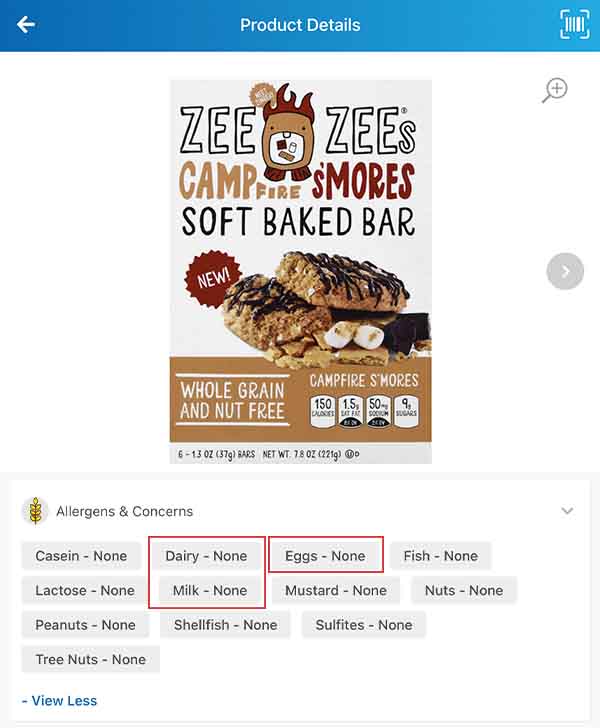
Yet the manufacturer reported to us that milk and eggs are in fact processed in the same line as this product is made:
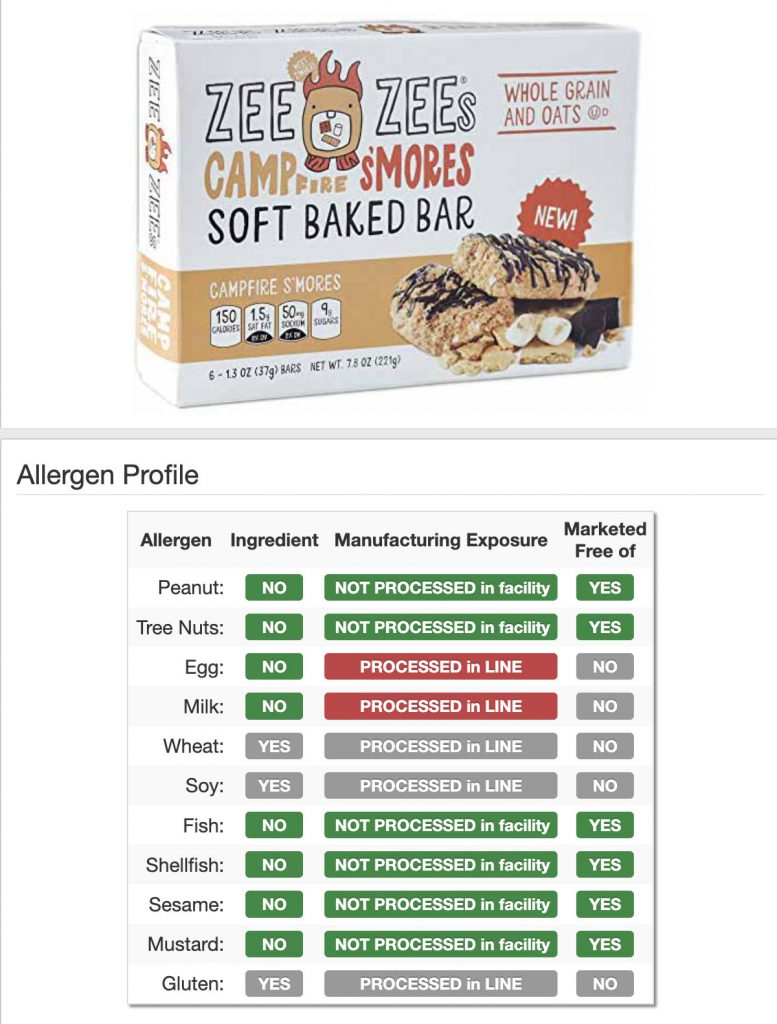
Furthermore, the manufacturer has informed us they do not test finished product for milk or egg trace.
Example 2: Nature’s Earthly Choice Broccoli Rice
In this example, FARE’s Sifter app lists the product as having no allergen concerns regarding the potential for wheat, gluten, and soy cross-contact:
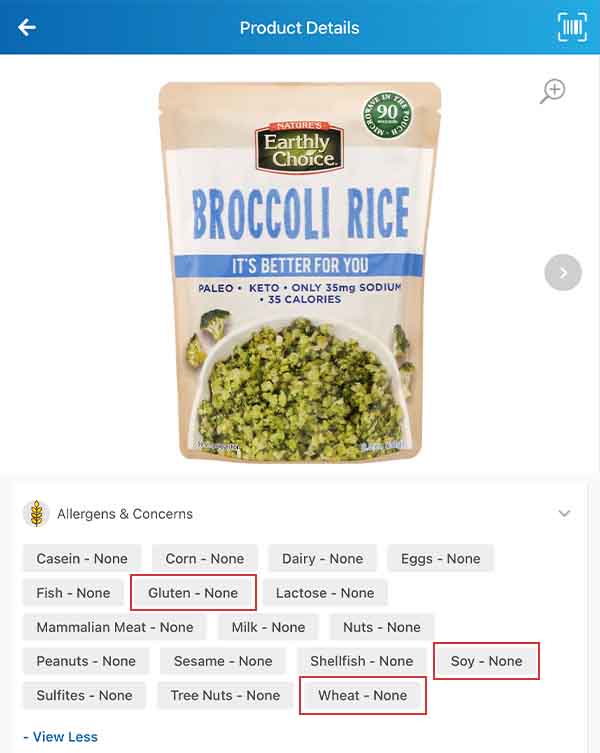
Yet the manufacturer reported to us that wheat, gluten, and soy are in fact processed in the same line as this product is made:
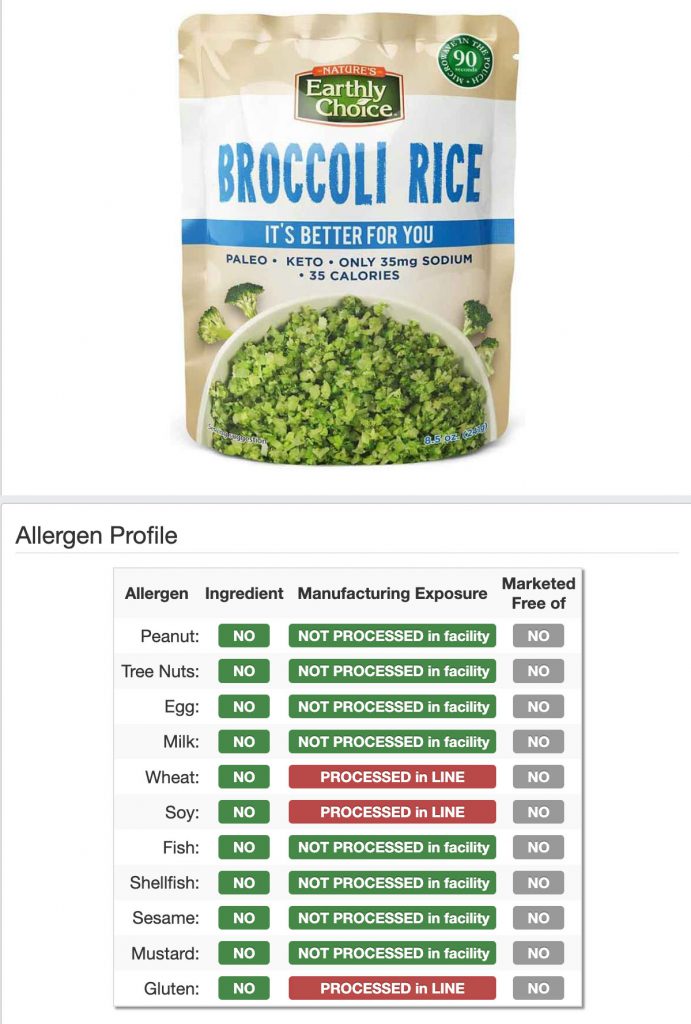
Furthermore, the manufacturer has informed us they do not test finished product for wheat, gluten, or soy trace.
Example 3: Late July SubLime Organic Multigrain Tortilla Chips
In this example, FARE’s Sifter app lists the product as having no allergen concerns regarding the potential for tree nuts, milk, and sesame cross-contact:
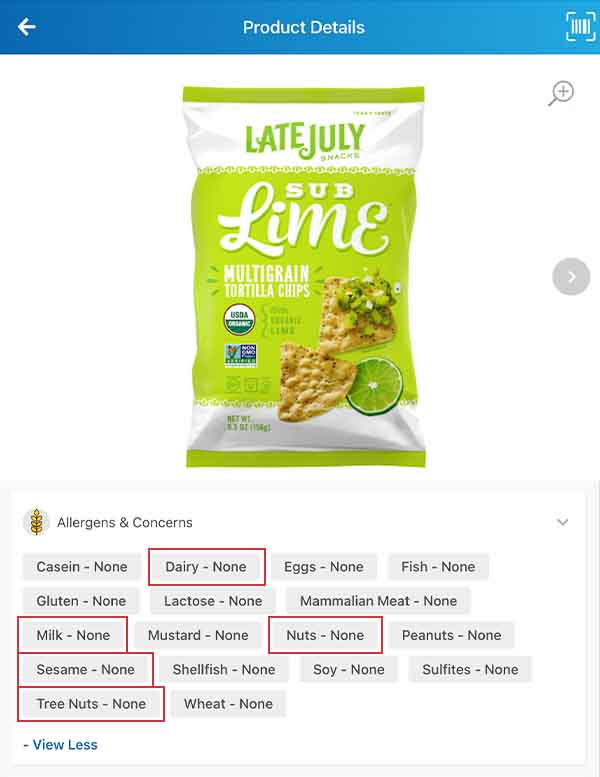
Yet the manufacturer reported to us that wheat, gluten, and soy are in fact processed in the same line as this product is made:
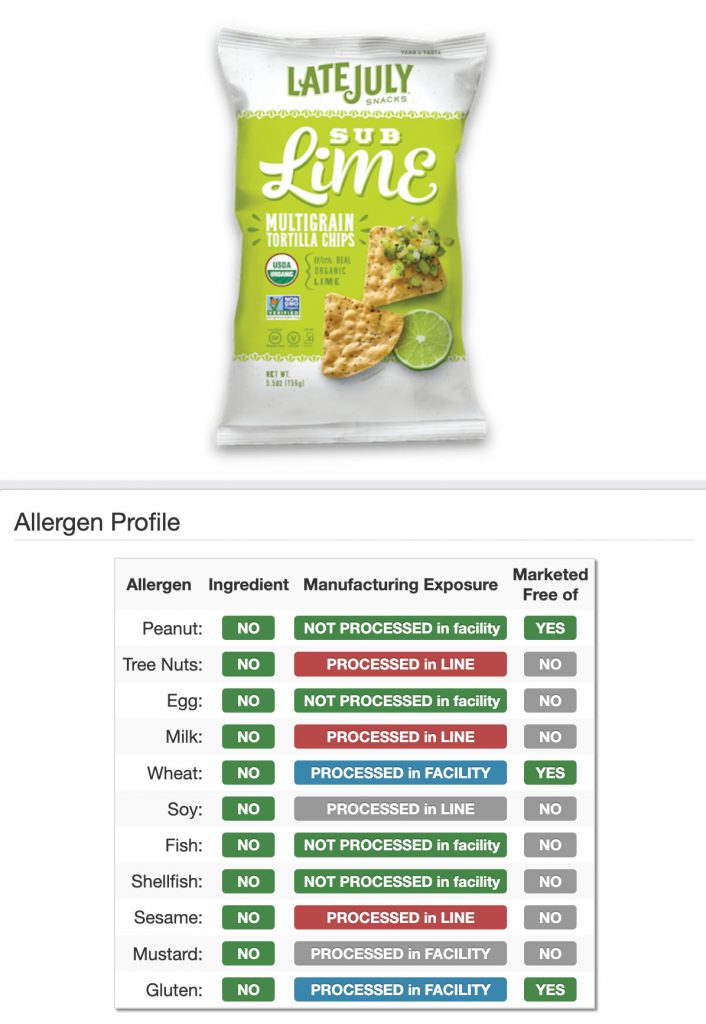
While we know the manufacturer tests for gluten trace in order to achieve a gluten-free certification for the product, they have informed us they do not test for coconut, milk, or sesame trace.
Conclusions
Given the short time it took us to find examples of misleading information, we presume there are hundreds of products — possibly thousands — that are similarly misrepresented. As such, we firmly believe FARE’s Sifter app presents a danger to the allergic community by frequently failing to inform users when their allergens of concern are processed in the same line or facility as the products are manufactured.
The problem is further compounded by FARE’s endorsement and promotion of Sifter which — given FARE’s reputation as a leading advocate for the food allergy community — confers a level of trust to the app it does not warrant.
So why does FARE insist on promoting an app they know provides misleading information to the very community their mission is to protect? We assume they receive compensation for doing so, but the organization should never place funding before safety.
We call upon FARE’s management and Board of Directors to terminate the organization’s co-branding and promotion of Sifter. Only by doing so can they restore FARE’s reputation as a true advocate for the allergic community.


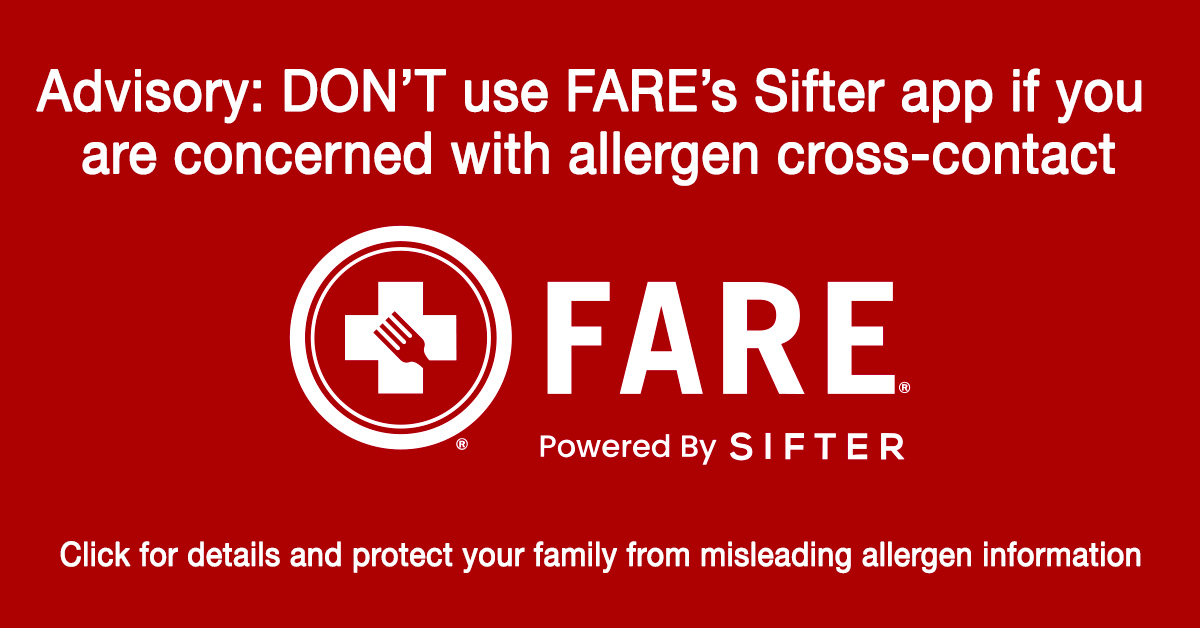




I received the following from FARE about the Sifter app:
Jason – thank you so much for reaching out to us and sharing your concerns regarding the Sifter app. I appreciate your long-time support for our work on behalf of the food allergy community. The Sifter app connection to FARE you saw was from a past and now long ended partnership. It does not reflect FARE’s dedication to supporting food allergy patients on our journey of managing the disease, nor the vision of our CEO Dr. Sung Poblete.
I am so sorry for the delay in responding to you, I passed along your concerns to our leadership so we can take action. As a result of you alerting us, we reached out to Sifter and asked them to take down any mention of working with FARE. Please rest assured that this is not the way we do business. Thank you for giving us the opportunity to correct the mistake with Sifter.
Thank you again for your past generosity to FARE and our work.
If there is anything else I can do to help you, please let me know.
With gratitude,
John
JOHN CHIUCO
Director of Individual Giving
Food Allergy Research & Education
O: 571-771-8718
F: 703-691-2713
E: jchiuco@foodallergy.org